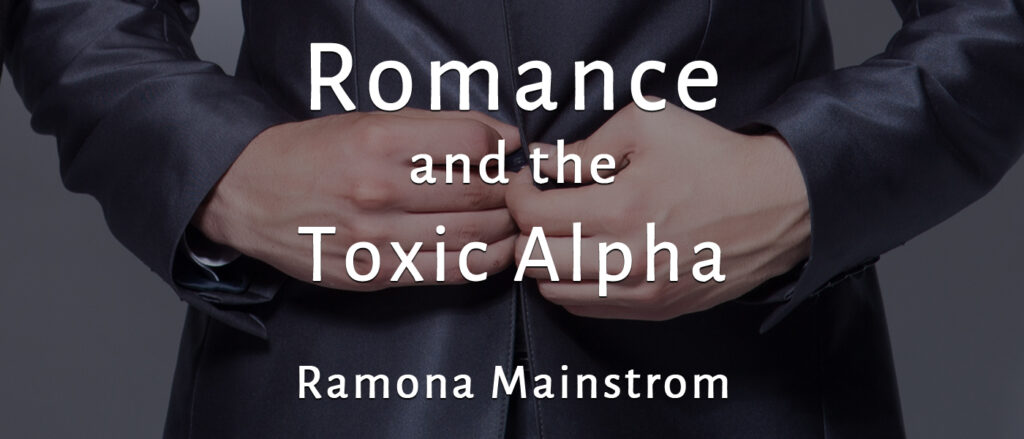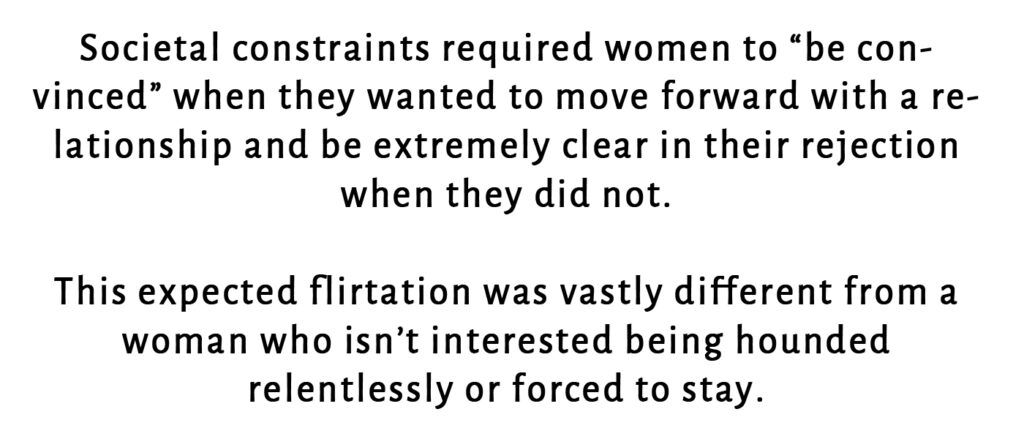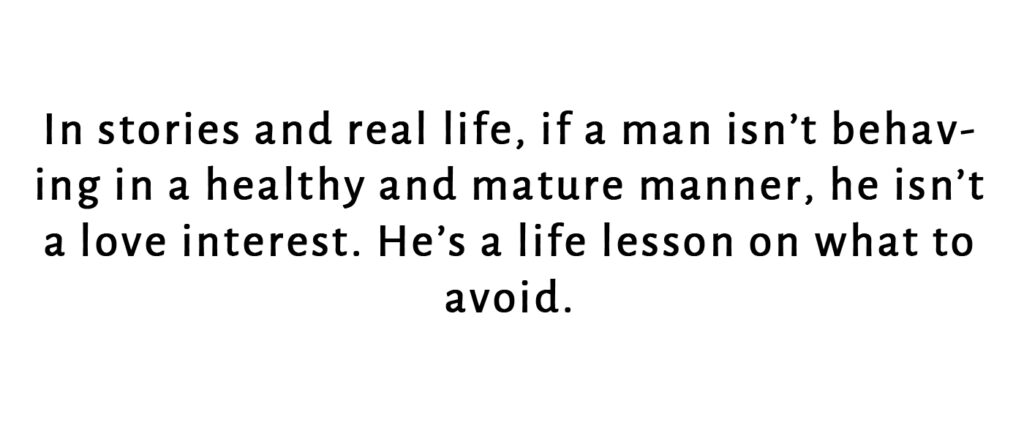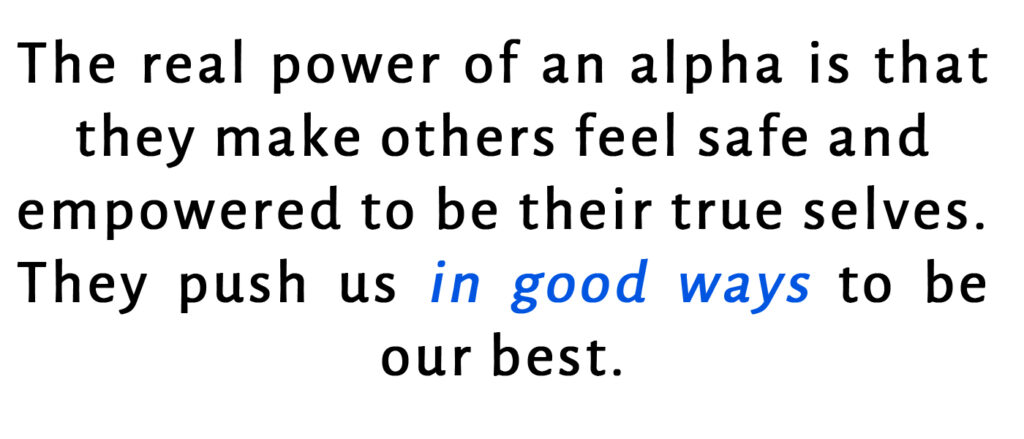Original published as a guest post for Three Furies Press June 20, 2022

Society has a love-hate relationship with ‘alpha males’. Mainstream media depicts alpha men as narcissistic, angry, and abusive. They violate boundaries, compromise values, and diminish women. They stalk, badger, and intimidate women.
The constant barrage by media enforces the idea this type of negative behavior is acceptable and even desirable. It perpetuates the harmful myth that women pretend to want a ‘nice guy’ but secretly lust for the ‘bad boy’. It creates unhealthy expectations, leading to dangerous environments for real life romance. These toxic alphas invaded modern romance, giving rise to dark romance genres, such as bully romance where the entire relationship is unhealthy, and motorcycle club and mafia romance where the men are literally criminals. In BDSM and erotica, they feed the negative social view of unconventional sexual expression. In sub-genres like YA, reverse harem, and paranormal romance, they create damaging ideals.
How did our society and the romance genre reach this point?

Origins of the Alpha Myth
The modern concept of alphas comes from biologist, Rudolph Shenkel, who observed captive wolves in the 1960’s and mistook aberrant behavior as normal. Shenkel’s research was published by David Mech in, The Wolf: The Ecology and Behavior of an Endangered Species, popularizing both the misconception of wolf dynamics and the term ‘alpha’.
Through his own studies, Mech discovered alpha wolves are literally the pack’s parents and spent decades trying to correct the misinformation. Unfortunately, the damage was already done. Shenkel’s version became embedded in society’s consciousness and intertwined with society’s evolving views of romance.
Social Evolution
At the start of the 20th century, women’s rights were limited. Sexuality was taboo. Unchaperoned women in the company of a man were arrested for prostitution. Being alone with a man resulted in a bad reputation and deep shame for her family, even after the modern concept of dating took hold in the 1920’s.
Societal constraints required women to use ‘feminine wiles’ to navigate romance. If a woman wasn’t interested, she’d state it clearly and terminate all contact. If she was interested . . . she provided her intended paramour an opportunity to make his advance. Then, to avoid looking eager, she offered reasons to refuse him while allowing him to ‘convince’ her, as illustrated in the controversial song, Baby, It’s Cold Outside. Once persuaded to accept, her gentleman assumed responsibility for her well being, placating both family and society.

This delicate social foreplay is different than a disinterested woman being hounded by a suitor. Modern men often regard a woman’s polite rejection is part of a courtship game where she needs to be convinced, especially if she ‘lets him down easy’. The toxic alpha image and popular movies where the rejected male harangues his target until her resolve breaks romanticize the idea of the obsessive “chase”.
Unwanted pursuit is such a frighteningly common occurrence, security specialist, Gavin De Becker, wrote The Gift of Fear to help women. De Becker offers this valuable advice:
“Do Not Negotiate. Once a woman decides she doesn’t want a relationship with a man, it needs to be said clearly one time. Any contact after her rejection will be seen as a negotiation.”
Romance of the 70’s and 80’s
Despite progress, the 1970’s and 1980’s were still archaic. Women couldn’t get credit cards or take maternity leave, and marital rape was a husband’s right. Romance of the time appears equally primitive, but it was surprisingly empowering.
Award-winning romance author and RITA finalist, Karen Harbaugh explains: “The real fantasy in many romance novels was that instead of being run over by men and society in general, [the heroine] had the man at her feet by the end of the story. Oh, she might start out constrained by him and society in some way. But that’s not how it ends.
“He ends up believing her wants, needs, and life are as important if not more important than his. She’s conquered him, and he is symbolic of patriarchal society.”
This once progressive approach to romance became twisted to fuel fallacies that women secretly want guys to treat them like trash. Being someone’s savior, suffering for someone, or bringing out their hidden ‘heart of gold’ are familiar fantasies in romance. Too many women end up in real life abusive relationships, hoping to change their loved one.

Women and Sexuality
Besides a twisted version of alpha behavior and forgotten social realities of the past, society has a corrupted mentality about sex, sexuality, and what’s acceptable for women. There are restrictions on what women can do with our bodies. We’re limited in our ability to gain medical help for our sexual health and accesses education on our biology and sexuality. We’re shamed and persecuted about reproduction decisions.
Women are held to antiquated standards which dictate how we behave and dress. Our sexual identities are invalidated. We’re vilified for being sensual or flirtatious. We aren’t supposed to enjoy or desire sex except to procreate. And heaven forbid we engage in anything considered kinky, wild, or creative.

Men aren’t educated on how a female body works or their responsibilities toward reproduction. The Kama Sutra which deals with all aspects of sexual life, including ethics and emotional fulfillment, is met with disdain as a ‘dirty’ sex book.
These alarming indicators of repressed healthy sexuality are reflected in our romance fiction. Instead of embracing healthy sexuality, mainstream media teaches that noxious men are sexy and women should aspire to be ‘claimed’ by them. The so-called alpha must push a woman’s boundaries to show her what she yearns for. He alone gives her permission to explore and (secretly) enjoy what society has told her she’s not allowed to want or like.
Healthy Alphas
The real power of an ‘alpha’ is that they make others feel safe and empowered to be their true selves. They push us in good ways to be our best.
True alphas have strong leadership and communication skills. They care about and respect others. It’s an innate part of their make-up to protect and provide for loved ones.
While the bossy, domineering attitude is there, so are boundaries, self control, and compromise. Like any healthy adult, they accept rejection gracefully. And when it comes to romance, there may be manhandling – with consent – in a fun and non-threatening way.
They are men we’re proud of, don’t have to defend to friends or family, and empower us while still being pure alphas.

Time to Shift
The dragon shifter romance, Queen of New Orleans showcases the difference between healthy and toxic alphas. One creates a safe, loving environment while the other becomes obsessive, terrifying, and even dangerous. The contrast between the two is stark and heart-wrenching—Just as it is in the real world.

As the romance genre continues to idealize alpha males, authors need to recognize the damage done by advocating toxic traits based on deviant behavior. It’s time to normalize healthy alphas, in fiction and real life, and encourage the idea that women can (and should) explore and enjoy sexuality without force, intimidation, or humiliation from her partner.